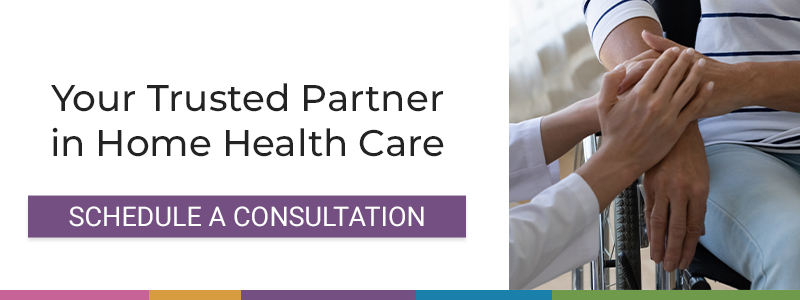The ability to tend to your own needs provides independence, which is one of adulthood’s hallmarks. However, the capacity for self-care gradually (and sometimes suddenly) dwindles with age. With this in mind, Alliance Homecare is dedicated to providing in-home nurse care to help elderly adults maintain their dignity and autonomy.
As your aging parent becomes physically or mentally impaired, they may not care for themselves sufficiently. You might notice a decline in personal hygiene, lack of proper nutrition, missed doctor appointments, unpaid bills, a dirty home, or poor management of prescription medications. Though the process of growing old can alter one’s routine, the benefits of home care are meant to fill in these gaps when necessary.
Arranging for regular care is a reasonable solution, but what happens when your elderly parent refuses help? Whether you’ve already broached the subject or are putting it off for fear of how your parent may respond, Alliance Homecare is here to help. Read on for detailed guidance on helping loved ones who are reluctant for support and elderly care.
How to Help Aging Parents Who Don’t Want Help
It’s not uncommon for a suggestion for help to be met with anger, resentment, or even denial. have lived full lives, including decades of adulthood, and it’s understandably uncomfortable for them to recognize a need for assistance.
Aside from wanting to maintain independence, many people struggle with the idea of letting someone into their personal affairs—even their children. Wanting privacy and freedom to make decisions is reasonable, and it’s important to keep this in mind when seeking a long term care solution.
You also want to know they’re safe and healthy, especially when you can’t be there. When it becomes clear your aging parent is unable to live independently without assistance, making a long term care plan to help them is what any loving son or daughter would do. It’s a tough position to be in, but the following pointers can help you navigate the next steps.
Evaluate the Situation
Before confronting your parent or taking any action, we recommend thoroughly evaluating the situation. Consider the current state of their physical health, mental capacity, and living condition, as well as their everyday needs.
Activities of daily living (ADLs) include basic self-care tasks pertaining to personal hygiene, eating, drinking, dressing, taking medications, and going to the bathroom. IADLs (instrumental activities of daily living) involve things that aren’t absolutely necessary for health and functionality but are critical components of living independently. This includes activities like grocery shopping, running errands, doing laundry, maintaining a home, communicating with people outside the home, and attending doctor appointments. If you’re not sure what their everyday needs are beyond basic ADLs, you may want to spend some time caring for your aging parent to observe their day-to-day life.
Which basic ADLs and IADLs are they able to do on their own, and which tasks might they need assistance with? Is there a disconnect between the tasks they believe they can perform on their own versus those they definitely need help with? Another thing to consider is the activities they enjoy doing themselves versus those they aren’t as attached to, as this can give you an idea of where they may be more or less willing to accept the help of a professional caregiver. When your parent asks, “what is ADL Care?” how should you respond? The best way to present the concept is by ensuring that this type of care is designed to supplement the daily routine tasks that an elderly person may not be able to perform but are necessary to living a full life.
Stay Positive
If you’re concerned about approaching a stubborn parent who may refuse help, it’s important to stay positive when communicating with them. Diving into the negatives—such as their cognitive decline, physical limitations, and lack of self-care—can make a person feel depressed about their condition, embarrassed, and often defensive.
Instead, broach the subject with optimism, focusing on how you’d like to help them stay as healthy as possible while maintaining independence. You can also acknowledge their values, preferences, and favorite activities, reiterating that the goal is to find a way for them to continue living a life they enjoy. You’ll want to communicate that obtaining care isn’t about forgoing freedom, but rather a means to live where they want to and how they want to for as long as possible.
Ask Questions
It can also help to ask a variety of questions when considering care options. This will encourage your senior parent to be a part of the discussion and may help them realize that accepting assistance is in their best interest.
You can ask questions such as:
- How would you feel about having someone help out a few days a week?
- Are you open to hiring someone to assist with meal prep, cleaning, and laundry?
- Would you be comfortable having someone drive you to doctor appointments?
- Are you concerned about a lack of privacy?
- Are you nervous about having someone you don’t know in your home?
When they answer these questions, you can explain how a caregiver can benefit them in various scenarios. For instance, housekeeping and meal prep can be time-consuming and physically draining. Having someone take care of these tasks can free them up to socialize with friends and family, as the importance of companionship for elderly people should not be overlooked. With regard to privacy, tell your parent you understand their concern and that it’s your goal to make sure they’re as comfortable as possible.
Present Options
At this point, you can present your parent with different care options. This is crucial, as it helps them feel like they have some say and that their opinions and preferences matter. With that said, the options you present should ultimately provide solutions to the specific areas in which they need help.
For example, if your mom or dad cannot perform basic ADLs, having someone assist with strictly home maintenance won’t cut it. They’ll need some form of ADL care, which they can get right at home.
The Home Care Solution
The two primary options are nursing or assisted living facilities and home care. There are certainly benefits to both solutions, and yet we believe home care is more effective with better health outcomes. Additionally, it’s usually more affordable than an assisted living facility. Not only that, but aging parents are often more willing to accept in-home assistance than they are to agree to move into a nursing home.
Private nursing care and in-home ADL care can be personalized to the unique needs of your elderly mother or father. Change can be uncomfortable, and while they may not be used to receiving outside help, the adjustment period is often smoother with at-home care. They’ll be comfortable in their own home with the freedom and dignity they deserve, all while receiving the care they need.
As a home care provider, Alliance HomeCare’s team of caregivers and care managers are prepared with the tools and other necessary resources they need to care for their clients during the pandemic. We are doing all we can to provide the safest services possible and continually stay updated with the CDC’s guidelines. Here are some of the extra measures Alliance HomeCare has taken:
- Employee’s self-quarantine for those who have been out of the country
- Increasing the cleaning frequency of all public areas
- Preparing emergency prep for clients including food stocking & security measures
- Planning for the worst-case scenario
- Actively changing protocol, procedures, and communication methods as the situation develops and new information is received
At-Home Elderly Care in New York City
According to a Pew Research Center survey, nearly 20% of adults with parents between ages 65 and 74 say they need assistance, and almost half with parents 75 and older say they require help. Family members provide the majority of assistance for aging adults. While this can be a suitable option, the responsibilities may be overwhelming and unrealistic for one person to take on alone. It can be especially overwhelming if your loved one has a chronic illness and requires chronic illness care like Multiple Sclerosis home care. Without the specialized training of a health professional, it can be hard to do it all on your own.
Alliance Homecare is a leading LHCSA (licensed home care services agency) serving patients throughout the New York City metropolitan area. Our highly qualified team members are well experienced with at-home medical care. The team includes registered nurses, home health aides, care ambassadors, dedicated care managers, and other healthcare specialists. Offering a new standard for at-home care, we’re committed to ensuring your parent remains as comfortable, safe, and healthy as possible in their preferred environment.
Our services include home health aide care, including ADL support, light housekeeping, companionship, and other non-medical assistance. Additionally, we offer in-home nursing care, which covers a wide range of medical needs, such as medication management, post-surgical recovery, catheter care, wound care, pulmonary care, and hospice. If you are content with your current care arrangement but feel you need some time back for yourself, we also offer respite care in New York.
Alliance Homecare also offers respite care for family members who need temporary relief from caregiving. Our Team will review all aspects of the clients’ needs with an in-home or virtual assessment. We provide a personalized care plan for the families’ and clients’ needs. Whether you need coverage for one day, a couple of weeks, or a few days a week on an ongoing basis, our compassionate care team would be happy to fill in.
Are you interested in learning more about the in-home care we provide in New York City? Contact Alliance Homecare today.
External sources:
- https://www.aarp.org/caregiving/life-balance/info-2019/when-aging-parents-resist-help.html
- https://www.pewsocialtrends.org/2015/05/21/4-caring-for-aging-parents/
- https://www.aarp.org/home-family/caregiving/info-07-2013/caregiving-aging-parents-jacobs.html
- https://www.nia.nih.gov/health/what-are-signs-aging-parent-needs-help





